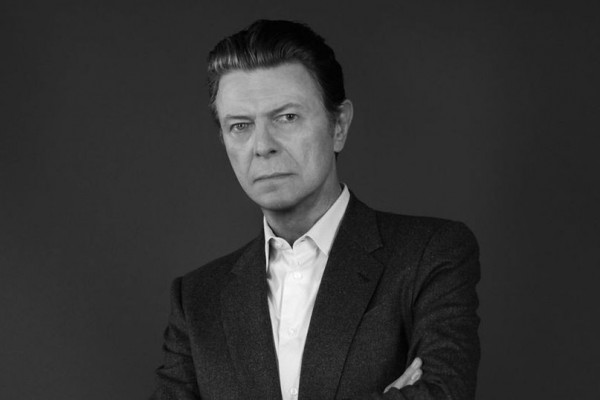
It seemed that the theme of 2016 was "this is bullshit." Whether it's objectively true that we lost an inordinate amount of heroes this year is unknown, but it sure seemed that way. We lost many, many legendary musicians and artists this year, including many in the punk scene and many that were influential to the punk scene. So, below we've posted a few pieces on musical champions that passed away in 2016 (and late 2015,) that were important to us individually. Feel free to add your own tributes in the comment sections. Let's hope 2017 is better. Whew!
John Berry
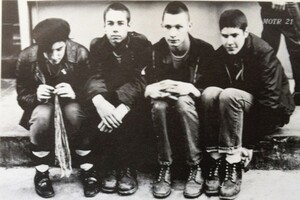 Although he might not be among the three most recognizable names of the Beastie Boys, John Berry wounded up influencing legions of people directly and through the ripple effect caused by his contributions. A founding member of the Beastie Boys, Berry coined the name as well as laid down the guitar lines on the band’s earliest release, which helped cement the band in hardcore lore as the band of teenage punks that walked that strange line between Bad Brains and Toy Dolls. -John Gentile
Although he might not be among the three most recognizable names of the Beastie Boys, John Berry wounded up influencing legions of people directly and through the ripple effect caused by his contributions. A founding member of the Beastie Boys, Berry coined the name as well as laid down the guitar lines on the band’s earliest release, which helped cement the band in hardcore lore as the band of teenage punks that walked that strange line between Bad Brains and Toy Dolls. -John Gentile
David Bowie
 On January 8th, 2016, David Bowie’s 69th birthday, he released the amazing Blackstar and on January 10th he lost an 18-month battle with liver cancer. Bowie’s importance and influence is immeasurable, even in the punk realm. An idol to weirdos and outsiders everywhere, Bowie never compromised his visions in his music, personas or visuals. Constantly evolving and never stagnant, it is fitting that his final statement Blackstar was like nothing he had done before, and something completely unique in the musical landscape as a whole. Stirring jazz and hip hop textures into a dark, spooky rock record, he showed that true artists never stop pushing themselves. The world has lost a true genius. -Greg Simpson
On January 8th, 2016, David Bowie’s 69th birthday, he released the amazing Blackstar and on January 10th he lost an 18-month battle with liver cancer. Bowie’s importance and influence is immeasurable, even in the punk realm. An idol to weirdos and outsiders everywhere, Bowie never compromised his visions in his music, personas or visuals. Constantly evolving and never stagnant, it is fitting that his final statement Blackstar was like nothing he had done before, and something completely unique in the musical landscape as a whole. Stirring jazz and hip hop textures into a dark, spooky rock record, he showed that true artists never stop pushing themselves. The world has lost a true genius. -Greg Simpson
Micky Fitz
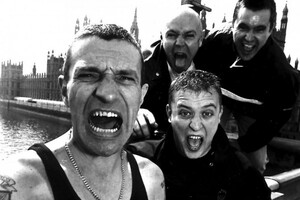 Micky Fitz of The Business was not a household name, but he was an extremely influential voice in street-punk and Oi! circles. For more than 35 years he fronted The Business, one of the bands that helped define those genres. Bands like Rancid and Dropkick Murphys certainly owe him a debt of gratitude. Micky was also beloved for his willingness to share a drink and a laugh with almost anyone. He was pillar of skinhead culture and a very friendly guy. Cancer took him much too soon, he was only 57, but we’ll always have his music. So as 2016 winds down, don’t forget to raise a pint of Guinness to Micky while jamming on Suburban Rebels or Saturdays Heroes. You’ll be hard pressed not to sing along loud and proud at the top of your lungs. -Tom Trauma
Micky Fitz of The Business was not a household name, but he was an extremely influential voice in street-punk and Oi! circles. For more than 35 years he fronted The Business, one of the bands that helped define those genres. Bands like Rancid and Dropkick Murphys certainly owe him a debt of gratitude. Micky was also beloved for his willingness to share a drink and a laugh with almost anyone. He was pillar of skinhead culture and a very friendly guy. Cancer took him much too soon, he was only 57, but we’ll always have his music. So as 2016 winds down, don’t forget to raise a pint of Guinness to Micky while jamming on Suburban Rebels or Saturdays Heroes. You’ll be hard pressed not to sing along loud and proud at the top of your lungs. -Tom Trauma
Lemmy Kilmister
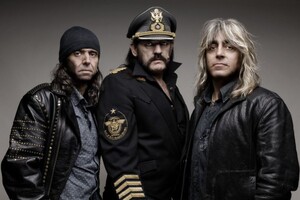 Lemmy Kilmister was always a leader and never a follower. He even died in late 2015 rather than share 2016 with everybody else. Few people were as influential as Lemmy and Motörhead in both punk and metal circles. As a character, Lemmy was larger than life. He played in the British invasion group The Rockin’ Vickers. He was a roadie for Jimi Hendrix. He played in the early space rock band Hawkwind. He gave Sid Vicious bass lessons. For almost 40 years he fronted one of the most recognizable bands in all of punk and metal. He toured up until only a couple of weeks before his death. His love of speed, booze, cigarettes and fast women is the stuff of legend. He was also an intellectual, a gentleman, a history buff and a genuinely nice guy. You don’t have to look far to hear the tales of his big heart and big appetite. He lived all 70 of his years exactly like he wanted to. Sometimes Lemmy the man overshadows Lemmy the musician, but that shouldn’t be the case. As a musician, he left behind an unbelievable body of work. Those Motörhead albums are his true legacy. The only way to truly honor the man is to pour a nice tall glass of Jack and Coke and crank up Overkill, Ace of Spades, Iron Fist or Black Magic. RIP Lemmy. The world is not likely to see another one like you. -Tom Trauma
Lemmy Kilmister was always a leader and never a follower. He even died in late 2015 rather than share 2016 with everybody else. Few people were as influential as Lemmy and Motörhead in both punk and metal circles. As a character, Lemmy was larger than life. He played in the British invasion group The Rockin’ Vickers. He was a roadie for Jimi Hendrix. He played in the early space rock band Hawkwind. He gave Sid Vicious bass lessons. For almost 40 years he fronted one of the most recognizable bands in all of punk and metal. He toured up until only a couple of weeks before his death. His love of speed, booze, cigarettes and fast women is the stuff of legend. He was also an intellectual, a gentleman, a history buff and a genuinely nice guy. You don’t have to look far to hear the tales of his big heart and big appetite. He lived all 70 of his years exactly like he wanted to. Sometimes Lemmy the man overshadows Lemmy the musician, but that shouldn’t be the case. As a musician, he left behind an unbelievable body of work. Those Motörhead albums are his true legacy. The only way to truly honor the man is to pour a nice tall glass of Jack and Coke and crank up Overkill, Ace of Spades, Iron Fist or Black Magic. RIP Lemmy. The world is not likely to see another one like you. -Tom Trauma
Rob McAllister
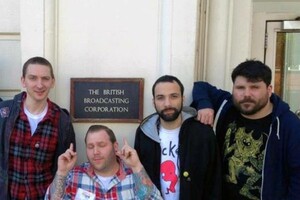 The passing of Rob McAllister, who played guitar in Capital and Iron Chic, in February came as a terrible surprise to many of us. To say he was beloved by his family and friends and musical community would most literally be an understatement. It’s easy to romanticize those who’ve died too soon. And it’s easy to get caught up in the sentimentality of that moment. But Rob truly was a guy that brightened the room and the stage. I won’t pretend as though he was a super close friend or someone I grew up with. He wasn’t. Rob was a guy that I met going to shows on Long Island over a decade ago. He was one of those people who you found yourself talking to in between bands or outside smoking a cigarette. He was just an approachable and welcoming guy. He loved to gives hugs and tell crazy stories.
The passing of Rob McAllister, who played guitar in Capital and Iron Chic, in February came as a terrible surprise to many of us. To say he was beloved by his family and friends and musical community would most literally be an understatement. It’s easy to romanticize those who’ve died too soon. And it’s easy to get caught up in the sentimentality of that moment. But Rob truly was a guy that brightened the room and the stage. I won’t pretend as though he was a super close friend or someone I grew up with. He wasn’t. Rob was a guy that I met going to shows on Long Island over a decade ago. He was one of those people who you found yourself talking to in between bands or outside smoking a cigarette. He was just an approachable and welcoming guy. He loved to gives hugs and tell crazy stories.
I remember Rob most fondly because we shared the stage together many times. My old band, Crime in Stereo, played lots of shows with Capital. And as it happened one weekend, we needed a fill-in guitarist for some shows. We asked Rob, and he said he was down without hesitation. We got in just one practice with him before the weekend. He was playing stripped down versions of the rhythm guitar tracks. When we mentioned to him that he should be playing ‘this’ for the rhythm track, Rob just smiled and said, “Why don’t I play what I’ve been doing. It’ll be totally cool.†I think we were all caught off guard by his candor. And yet it made total sense. The shows were great. Rob played great. We hung out. We talked. We actually asked him to join CIS full-time.
Alas he couldn’t. But he put us in touch with a guy named Gary who he said was a great dude that just wanted tour and play music. To this day and long after I left CIS, Gary remains an integral part of the band and its history. The point, of course, is that Rob brought us all closer together.
It was fitting then that we all in CIS past and present found ourselves attending Rob’s wake together. Because Rob had brought us together those few years ago. Rob was simply like that. He made people smile. He made people forget the bullshit of the everyday world. And for me, at least, he made people feel welcome.
Every time Rob and I would see each other, we’d hug and catch up and shoot the breeze. But, without fail, he’d also tell me, “Dude I’m really glad I got to see you.†It didn’t matter if we’d seen each other for weeks in a row or for the first time in many months. And those words of kindness will always stay with me. It very much sums up who Rob was and will always be.
He was a wild and wonderful guy who became a wild and wonderful dad. He is survived by his daughter, Ramona, and his son, Robert Jr. And he is survived by the entire Long Island underground. Wild dad forever. -Michael Musilli
Erik Petersen
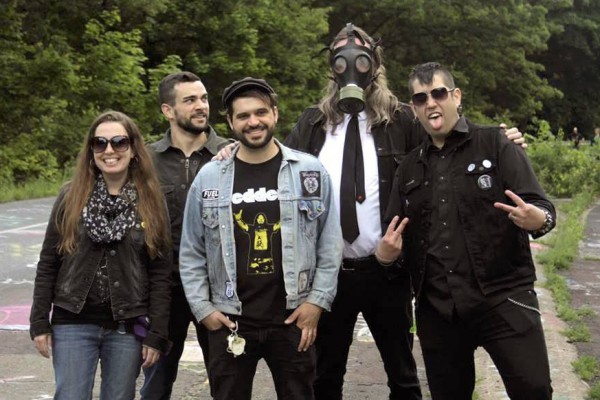 Well listen, what do I say? On a personal scale, Erik Petersen was the first interview that I ever did and it was his enthusiasm, wit, and kindness (as well as his kick-ass music) that encouraged me to keep doing this interview thing for over ten years now. I know not of a more decent, nice human being and it’s hard to find anyone that walked the talk the way Erik did. The loss of Erik is tragic and will reverberate for years and years.
Well listen, what do I say? On a personal scale, Erik Petersen was the first interview that I ever did and it was his enthusiasm, wit, and kindness (as well as his kick-ass music) that encouraged me to keep doing this interview thing for over ten years now. I know not of a more decent, nice human being and it’s hard to find anyone that walked the talk the way Erik did. The loss of Erik is tragic and will reverberate for years and years.
On a larger scale, the music of Erik and Mischief Brew was unparalleled. The man was one of the greatest songwriters ever. His ability to spin medieval warnings along side anarcho-punk attacks and make it all seem whimsical AND important truly was unique. Erik, like few others, was able to really make a point in his music without making it seem like sermonizing. You could draw parallels to Johnny Cash, George Clinton, and Nick Blinko, but really, Erik was one in a hundred billion. Yet, despite the bolts of talent that flashed from his fingertips with ease, he remained one of the most humble people I knew (I often told him he was too humble, a statement he would just whisk away with that impish grin of his). A gentle, shy, sensitive soul that had a true understanding of how things worked in this universe and one who truly did his best, knowing of these grand machinations, to make things better. One does fear deifying the deceased in these types of posts. But, truly- truly, truly, truly,- I cannot think of a single bad thing to say about Erik and I don’t know a single person that could. Any image or recollection I have of Erik is either of his obscene amount of talent or how he was a kind, warmhearted person. Man, what a talent. What a musician. What a guy.
Erik, thank you for your friendship. You shall not be forgotten, you shall never be equaled, and until we meet again, may all we do be all for our delight -John Gentile
Prince
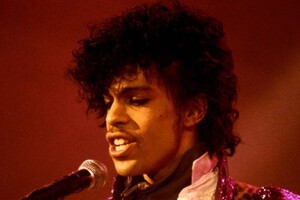 When you’re a teenage kid who has only been into punk rock a few years, you tend to be a music snob. Actually, that’s not true you tend to take a very limiting view of what does and doesn’t constitute good music. Rarely does this have anything to do with the actual quality of the music you’re listening to; instead you base it off of whatever fits within your definition of what’s “punk rock†that month. At fifteen my tastes were still limited to bands like Dead Kennedys, Minor Threat, Fugazi, The Minutemen, Bad Religion, select early nineties pop punk bands, hip-hop that pissed my parent off and thrash metal because they played fast and were angry. I guess that was close enough.
When you’re a teenage kid who has only been into punk rock a few years, you tend to be a music snob. Actually, that’s not true you tend to take a very limiting view of what does and doesn’t constitute good music. Rarely does this have anything to do with the actual quality of the music you’re listening to; instead you base it off of whatever fits within your definition of what’s “punk rock†that month. At fifteen my tastes were still limited to bands like Dead Kennedys, Minor Threat, Fugazi, The Minutemen, Bad Religion, select early nineties pop punk bands, hip-hop that pissed my parent off and thrash metal because they played fast and were angry. I guess that was close enough.
When I turned sixteen, I started working at a record store. I assumed it would be filled with people like me who loved punk rock and hated anything that had ever been in the Top 40 or sounded like it could have been. Luckily, my co-workers actually had taste and listened to a wide variety of music from indie rock, girl groups, sixties rock, glam, hip-hop, and funk. One day I walked into work and I just hear this blazingly fast guitar solo with a scream at the end of it. My ears perked up … I was impressed. I enquired as to it was. My co-worker sighs and responds, “Dude, that’s “Let’s Go Crazy†Prince.†At this point, I wasn’t super familiar beyond the smattering of videos I’d seen on Pop Up Video a few years earlier while getting ready for school in the morning.
We spent the rest of the day listening to his music, and it was all amazing. Sure, a lot of it was way more pop oriented than whatever I thought was “punk rock†that month. I also noticed that Prince wasn’t just that guy from Pop Up Video who sang “Kiss.†A lot of these songs were political, touched on gender norms, and were way more subversive than the music would have ever let on. Needless to say, I became a low level fan and would pick up whatever CDs of his people sold back. Little by little, as I dug deeper into his catalog I fell in love with everything he did … even songs I previously thought were cheesy as shit like the aforementioned “Kiss†or “Raspberry Beret.â€
Prince opened my ears up to music a lot that year. I wanted to know who influenced him so I dove into artists like James Brown, Funkadelic, and rock bands I had previously deemed uncool because my dad listened to them … like The Beatles. From there my taste in music opened up significantly and what was or wasn’t punk rock didn’t matter that much to me anymore. I developed an appreciation for song structure, vocal ability, and so forth. Prince took me from a suburban punk rocker with a very conservative view of what was and wasn’t good music to someone who wanted to absorb as much music as possible regardless of genre. In essence, Prince made me appreciate music.
Fast forward fifteen years, and I’m a thirty year old paying the bills with an office job. I’m sitting at my desk and the Facebook messenger icon pops up on my phone. It’s a friend linking me to the earliest articles about Prince’s passing, prior to his death even being confirmed. And some part of me froze in a way it hadn’t before when a musician died. Don’t get me wrong, I loved Bowie, but I only wound up listening to him because Prince broke down whatever preconceived notions of pop music I had when I was a teenager. When Prince’s death was confirmed by the Associated Press, I basically just sat at my desk the rest of the day in shock. I found out Minnesota Public Radio was playing highlights from all of his albums and speaking with people who knew him live on air that day. So, I downloaded their app and just sat there and listened to an on-air wake for six hours. I think between my own collection and what seemed like a month long marathon tribute on Sirius XM it was at least two weeks before I listened to music that wasn’t either performed or written by Prince.
And sitting here now, fifteen years after discovering his music … I can’t think of anything that’s more punk rock than how Prince challenged the music industry throughout his career, fought against the major label system loudly, and blazed a trail for musicians in the modern era who wanted to do the same. In article for the New York Times shortly after his death, longtime producer, Jimmy Jam, said that when Prince was told things had to be done this way because of music industry tradition that Prince’s only response was, “Why can’t we do it a different way? Why can’t we do it better?â€
And to think, I thought punk rock was about hair dye, combat boots, and loud guitars when I was fifteen years old. Thankfully, at thirty-one, I’ve opted to act my age … not my shoe size. -Jon Galliene
Prince Buster
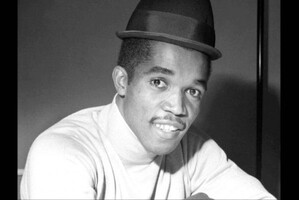 An iconic figure in Jamaican ska, Prince Buster was one of the earliest singers and producers to combine the happy, skipping beat with socially conscious lyrics. During ska’s heyday, Buster’s releases were new singles as much as they were news reports and editorials. Beyond that, for decades, Buster maintained his famous record shop in Kington which acted as a cultural hub, and spot for the newest hits, as well as a museum for history of the Island’s music. The recent robbery of that shop will cost history an invaluable loss, but Buster’s mark on Jamaican and ska music is indelible. -John Gentile
An iconic figure in Jamaican ska, Prince Buster was one of the earliest singers and producers to combine the happy, skipping beat with socially conscious lyrics. During ska’s heyday, Buster’s releases were new singles as much as they were news reports and editorials. Beyond that, for decades, Buster maintained his famous record shop in Kington which acted as a cultural hub, and spot for the newest hits, as well as a museum for history of the Island’s music. The recent robbery of that shop will cost history an invaluable loss, but Buster’s mark on Jamaican and ska music is indelible. -John Gentile
John Stabb
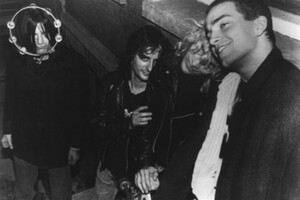 In 2016 we lost some very important mainstream artists, but we also lost some great, creative underground musicians. There’s no better example of this than legendary Government Issue frontman John Stabb, who died of cancer at 54. GI was a band that was not afraid to push the boundaries of punk and hardcore. Stabb was a visionary who never felt a need to abide by punk conventions. GI was also one of the few notable DC bands that operated outside of the Dischord family (with the exception of their first EP Legless Bull). You should really carve out some time in your schedule to listen to GI’s Complete History Volume One and Volume Two. It’s over four hours of inspired punk from Government Issue and will give you a true appreciation for John Stabb’s genius.-Tom Trauma
In 2016 we lost some very important mainstream artists, but we also lost some great, creative underground musicians. There’s no better example of this than legendary Government Issue frontman John Stabb, who died of cancer at 54. GI was a band that was not afraid to push the boundaries of punk and hardcore. Stabb was a visionary who never felt a need to abide by punk conventions. GI was also one of the few notable DC bands that operated outside of the Dischord family (with the exception of their first EP Legless Bull). You should really carve out some time in your schedule to listen to GI’s Complete History Volume One and Volume Two. It’s over four hours of inspired punk from Government Issue and will give you a true appreciation for John Stabb’s genius.-Tom Trauma
Vi Subversive
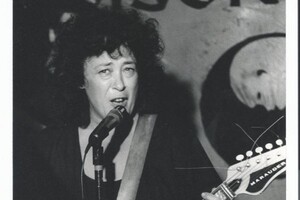 Just when punk was beginning to denigrated into an all-male expression, Vi Subersive, a 40 year old, self described housewife, came along and shook up the entire anarcho-scene. Combining her 40 years of experience with a strong feminist viewpoint, Subversive, in Poison Girls, brought issues relevant to women back into the punk scene. And her contribution still reverberates through the punk scene today. -John Gentile
Just when punk was beginning to denigrated into an all-male expression, Vi Subersive, a 40 year old, self described housewife, came along and shook up the entire anarcho-scene. Combining her 40 years of experience with a strong feminist viewpoint, Subversive, in Poison Girls, brought issues relevant to women back into the punk scene. And her contribution still reverberates through the punk scene today. -John Gentile
Alan Vega
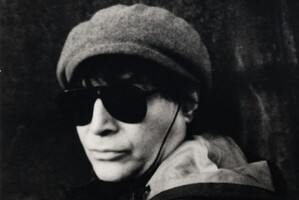 A pioneer in avant-garde music(as well as a member of the first band to use the word “punk†to describe their band), Alan Vega crafted minimalist, harrowing music and acted as a bridge between the Velvet Undergroud art-rock scene and the burgeoning punk scene. Vega’s lyrics were often off-the-cuff, abstract, and quite frankly, shocking. His early opus with Suicide, “Frankie Teardrop,†set his legend in stone, and that’s just the tip of his massive discography. -John Gentile
A pioneer in avant-garde music(as well as a member of the first band to use the word “punk†to describe their band), Alan Vega crafted minimalist, harrowing music and acted as a bridge between the Velvet Undergroud art-rock scene and the burgeoning punk scene. Vega’s lyrics were often off-the-cuff, abstract, and quite frankly, shocking. His early opus with Suicide, “Frankie Teardrop,†set his legend in stone, and that’s just the tip of his massive discography. -John Gentile